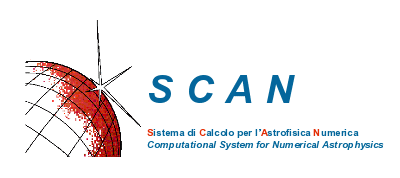SISTEMA DI CALCOLO PER L'ASTROFISICA NUMERICA (SCAN)
|
As the demand for calculation resources increased in 2000, the
OAPa reasearchers launched the SCAN service (Sistema di Calcolo per
l'Astrofisica Numerica; Computing System for Numerical Astrophysics).
At the present day the facility consists of four clusters Linux.
|
 |
-
MEUSA based on 72 nodes, each with 68-cores Intel Xeon
Phi7250 (Knight Landing) at 1.4 GHz, which enable an overall configuration
of 4896 cores; the cluster takes advantage of the new Intel Omni-Path
architecture, which provides the high-performance interconnectivity
required to efficiently scale the system’s thousands of cores.
-
CORVUS and SCAN2 based each on a single node with
64-cores AMD (Opteron Barcelona 2354, 2.2 GHz); the nodes are
equipped with Infiniband (Host Channel Adapter - HCA) and are
interconnected through the highly efficient switch InfiniBand
(Mellanox infiniscale III DDR).
-
SPHINX based on six nodes each with 8-cores and two nodes
each with 12 cores, for a total of 72 CPUs and 144 GByte of memory RAM,
hosted in four Twin Servers. The 64 bit nodes are based on processors
Intel (Xeon Harpertown E5420, 2.5 GHz) and AMD (Opteron Barcelona 2354,
2.2 GHz). All the nodes are equipped with Infiniband (Host Channel
Adapter - HCA) and are interconnected through the highly efficient switch
InfiniBand (Mellanox Infiniscale III DDR).
Personnel
| BOCCHINO Fabrizio | Researcher | INAF/OAPa |
| MORALE Flavio | Technician | INAF/OAPa |
| ORLANDO Salvatore | Researcher | INAF/OAPa |
| PERES Giovanni | Full Professor | University of Palermo |
| REALE Fabio | Full Professor | University of Palermo |
| SPEZIALE Salvatore | Technician | INAF/OAPa |
THE COMETA CONSORTIUM AND THE PI2S2 PROJECT
In 2005, INAF through its institutes based in Sicily (OAPa, Osservatorio
Astrofisico di Catania, and Istituto di Astrofisica Spaziale e Fisica
Cosmica di Palermo) promoted the foundation of the COMETA Consortium
and outlined the PI2S2 Project, as part of the key national project
'Research, High Training and Technologic Development' funded by the
Italian Ministry of Research and University. Other partners, besides
INAF, are: INFN (National Institute for Nuclear Physics); INGV (National
Institute for Geophysics and Volcanology); the Universities of Palermo,
Messina and Catania, and the SCIRE Consortium. The PI2S2 Project allowed
the creation of an e-infrastructure in Sicily based on the GRID paradigm
which can be used by researchers from OAPa. In particular, research
and development centres have been built in order to carry out very
important activities in the field of major research and technological
applications. The centres are equipped with HPC processors, new managing
and processing systems for large databases, new distributed computing
technologies and new systems oriented to multimedia simulations.
|